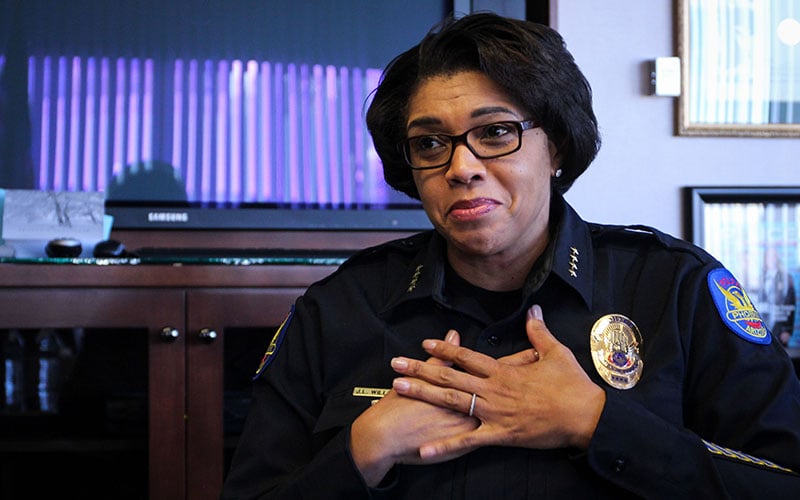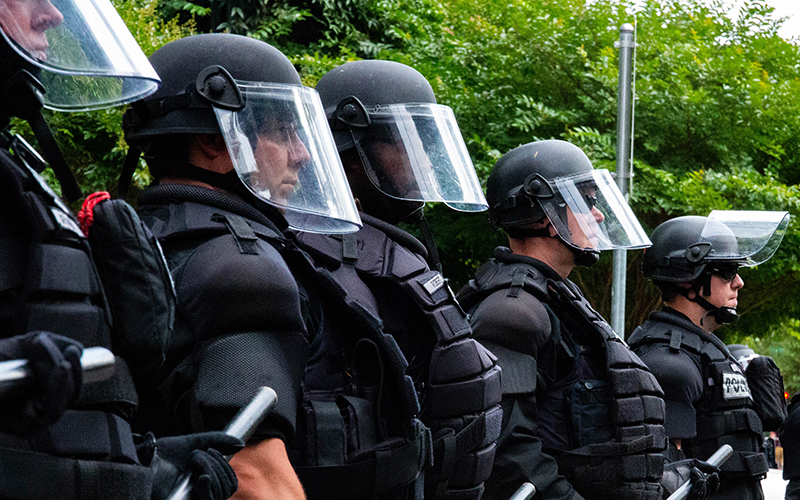
Phoenix Police Chief Jeri Williams took part in a U.S. Conference of Mayors panel with mayors and other chiefs to discuss police reform and racial justice, what one member called “one of the biggest challenges, not only at a local level but globally.” (File photo by Jenna Miller/Cronkite News)
WASHINGTON – Phoenix Police Chief Jeri Williams told a national forum Thursday that the pain the nation is going through in the wake of George Floyd’s death could end up being the catalyst for needed change.
It was a common sentiment among the mayors and big-city police chiefs from around the country who took part in a wide-ranging U.S. Conference of Mayors virtual panel to discuss police reform and racial justice.
The forum comes as cities across the country are grappling with the fallout of Floyd’s death a month ago at the hands of Minneapolis police, and as Congress and the White House are pushing their own policing reform proposals. Panel members said the nation is primed for change.
“We are at the center of one of the biggest challenges, not only at a local level but globally,” said Chicago Mayor Lori Lightfoot of the calls for police reform and racial justice.
Lightfoot is chairman of the mayors’ Criminal and Social Justice Standing Committee, which recently formed a Working Group on Police Reform and Racial Justice to respond to the problems that Floyd’s death highlighted. The working group Thursday unveiled one proposal, turning to a set of almost 200-year-old principles to respond to the very modern issue.
Rochester Hills, Michigan, Mayor Bryan Barnett outlined the six policing principles that the working group attributed to Sir Robert Peel, a British Prime Minister in the first half of the 19th century. Peel’s Principles state that policing must be based upon a relationship of trust between the police and the public.
The working group’s six principles call for redefining the role of local police and public safety, trust and legitimacy, sanctity of life, equality and due process, community, and transparency and accountability to reinforce constitutional policing.
Baltimore Police Commissioner Michael Harrison called them “guiding principles to change policing going forward.” Lightfoot, like a number of the mayors, focused on the issue of police-community relations, saying, “We must renew the trust of the people we serve.”
But calls to release records that show when officers have been suspended or terminated have been hotly debated in the fight over policing reform. When Elizabeth, New Jersey, Mayor J. Christian Bollwage asked police officials in the meeting if they were OK with the release of disciplinary records dating back 15 years or more, Williams offered her own story.
Having a mark on your record is not a career-killer, said Williams, who offered that she had a suspension in her past but was still able to move beyond it to become chief. But not disclosing records does not help if that hides serious actions “that people should know about,” those that are clearly wrong, racially or enforcement wise, she said.
Whatever the solution, most of the panel members said there must be a national standard for police in the U.S.
“There is an overarching need for national standards, holding law enforcement officers accountable,” Tampa Mayor Jane Castor said.
They also agreed that the time to act is now.
“This is the first time I’ve seen the whole country take a look at the role of police,” said Charles Ramsey, an adviser to the U.S. Conference of Mayors who served as police chief in both Philadelphia and Washington, D.C.
Williams, who said she was honored to be included on the working group, said she hopes something positive can come out of the recent struggles.
“The adversity that the country has been going through provides an opportunity for change,” she said.

